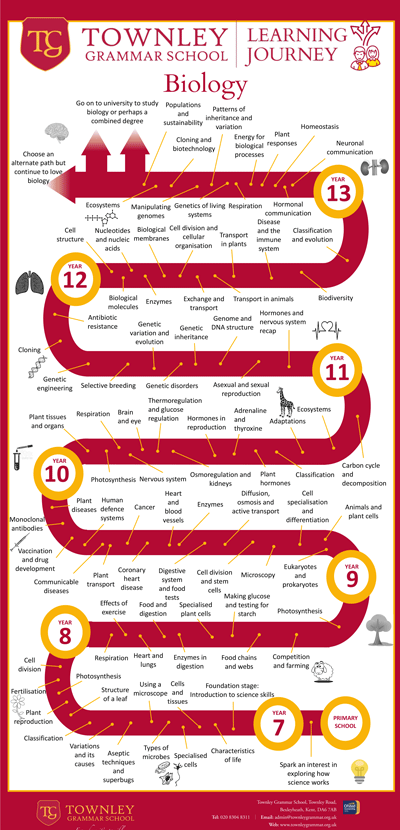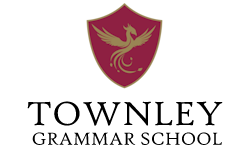- Home
- Our School
- News and Events
- Teaching & Learning
- Our Vision
- Curriculum
- Curriculum Vision
- Art
- Biology
- Chemistry
- Classical Civilisation
- Computer Science
- Dance
- Design Technology
- Drama
- Economics
- Engineering
- English Literature and English Language
- Film Studies
- Food Preparation & Nutrition
- Geography
- History
- Latin
- Mathematics
- Modern Foreign Languages
- Music
- Physical Education
- Physics
- Politics
- Religious Studies
- Sociology
- Subject Learning Journeys
- Character Education
- Townley 21c
- STEM
- EDGE
- Teaching and Learning Google Site
- Mentoring and Coaching
- Meet the Team
- Careers
- Examinations
- Professional Development
- Reporting Information
- Sixth Form
- Co-Curricular
- Pastoral
- Admissions
- Working with Us
- Contact Us
BIOLOGY
KEY STAGE 3 BIOLOGY
 At Townley Grammar School, the Science lessons we deliver in Years 7, 8 and 9 are designed to challenge and engage students, develop their practical and problem-solving skills and demonstrate the real-world applications of the topics they have studied. We have recently refreshed all of our schemes of work to reflect the new National Curriculum requirements, introducing a number of new resources and activities
At Townley Grammar School, the Science lessons we deliver in Years 7, 8 and 9 are designed to challenge and engage students, develop their practical and problem-solving skills and demonstrate the real-world applications of the topics they have studied. We have recently refreshed all of our schemes of work to reflect the new National Curriculum requirements, introducing a number of new resources and activities
In Years 7-8, students will typically have two double lessons (100 minutes each) of Science every week, usually taught by teachers with different specialisms, while the third subject is shared. Students appreciate the differences between the topics taught in Biology, Chemistry and Physics from early in Year 7, by the use of clearly identified topics, separate textbooks (the Longman 11-14 range) and exercise books for each subject.
Year 9 is a transition year where all students continue topics covered in the national curriculum as well as covering some materials from the GCSE course to stretch our students.
Each topic is assessed using both low-stakes testing and end-of-unit tests throughout years 7 to 9.
KEY STAGE 4 BIOLOGY (GCSE)
Biology is a core subject and the course that students will study is compulsory and lasts for 2 years. Students will receive a grade ranging from 1 to 9. Throughout this time students will be taught by a subject specialist.
The biology specification we study is designed to give students the knowledge and skills they need to be able to understand the world in which they live. Having a deep understanding of Biology is becoming increasingly important as students develop into active global citizens. The rise of issues such as antibiotic resistance, climate change and food security all serve to show how the knowledge and skills that students learn will help them to shape their futures. The key themes studied at years 10 and 11 are:
- Health and Disease
- Genetics
- Microbiology
- Ecology
Throughout the course practical work is used to develop students' skills in a way that helps understanding of theory and brings the subject alive in the classroom. Students will also develop their mathematical abilities to allow them to meet the rigour of the new GCSE course.
The course is suitable for all students regardless of whether or not they intend to carry on studying Science. The course does provide a sound preparation for study of GCE A level biology.
At Townley Grammar all students are entered for the GCSE Biology specification from the AQA examination board.
Assessment
This qualification is linear. Linear means that students will sit all their exams at the end of Year 11.
Paper 1
Topics:
- Cell biology
- Organisation
- Infection and response
- Bioenergetics
Assessment consists of one written exam which lasts 1 hour and 45 minutes. The paper consists of 100 marks and makes up 50% of the final GCSE grade. Questions will include multiple choice, structured, closed short answer and open response answers.
Paper 2
Topics:
- Homeostasis and response
- Inheritance, variation and evolution
- Ecology
Assessment consists of one written exam which lasts 1 hour and 45 minutes. The paper consists of 100 marks and makes up 50% of the final GCSE grade. Questions will include multiple choice, structured, closed short answer and open response answers.
Key Stage 5 Biology (A Level)
Having a deep understanding of Biology is becoming increasingly important as students develop into active global citizens. The rise of issues such as antibiotic resistance, climate change and food security all serve to show how the knowledge and skills that students learn will help them to shape their futures.
Over the course of the two years of study students will look at a range of units relating to the living world, allowing them to explain the environment in which they live and the impact that humans have upon it. This course can open doors to future careers in Medicine and Life Sciences as well as broadening understanding of the world around us.
Course Requirements
In order to study biology you need minimum of a 7 in GCSE Biology (or a 7 grade in both GCSE Core and additional Science).
Resources
Biology is taught at Townley Grammar by a team of well qualified and experienced biology subject specialists, who have a strong passion for their subject. Teaching mixes a range of practical, theoretical, research and problem solving approaches to provide students with a range of skills in well-equipped laboratories.
Skills
The skills required are:
- Planning – To select suitable apparatus and techniques, identify variables and evaluate experimental methods to solve problems in a practical context.
- Implementation – To use a wide range of practical apparatus and techniques correctly and to present observations and data in an appropriate format.
- Analysis – To process, analyse and interpret qualitative and quantitative experimental results using appropriate mathematical skills.
- Evaluation – To evaluate results and draw conclusions from practical experiments whilst identifying anomalies, limitations and measurements of precision and accuracy.
Assessment Structure
Year 12 Biology Overview
The course content and assessment are shown below:
- Module 1
Development of practical skills in Biology. This includes skills of planning, implementing, analysis and evaluation. - Module 2
Foundations in Biology. This includes: cell structure, biological molecules; nucleotides and nucleic acids; enzymes, biological membranes; cell division, cell diversity and cellular organisation. - Module 3
Exchange and Transport. This includes: Exchange surfaces, Transport in animals, Transport in plants. - Module 4
Biodiversity, evolution and disease. This includes: communicable diseases, disease prevention and the immune system, biodiversity, classification and evolution.
End of Year 12 mock examinations are sat in the Summer term.
Year 13 Biology Overview
The course content and assessment are shown below:
- Module 1, 2, 3 and 4 as in year 12.
- Module 5
Communications, homeostasis and energy. This includes: Communication and homeostasis, Excretion, Neuronal communication, Hormonal communication, Plant and animal responses, Photosynthesis, and Respiration. - Module 6
Genetics, evolution and ecosystems. This includes: Cellular control, Patterns of inheritance, Manipulating genomes, Cloning and biotechnology, Ecosystems, Populations and sustainability.
Papers
- Paper 1 Biological Processes - Multiple choice, structured and extended response (100 marks) 2 hr. 15
- Paper 2 Biological Diversity - Multiple choice, structured and extended response (100 marks) 2 hr. 15
- Paper 3 Unified Biology - Structured questions and extended response (70 marks) 1 hr 30
- Non-exam assessment – Practical endorsement for Biology
Course Progression
Related Course and Careers
The skills that you develop as a Biologist are invaluable in helping you to deduce logical arguments, relate observations to conclusions and evaluate and improve on tasks. The huge variety of potential careers within Biology are too numerous to include here, so here are some of the more popular career fields.
- The medical field - physician, nurse, chiropractor, podiatrist, exercise physiologist, nutritionist, dietician, pharmacist, laboratory technician, coroner, forensic scientist, pathologist, emergency medical technician
- Animal science - veterinarian, veterinary assistant, zoologist, marine biologist, wildlife biologist, fisheries biologist, animal trainer
- Plant life - agricultural research, botanist, the Forest Service, soil scientist, horticulturist
Biology is also recognised as a facilitating subject by Russell Group Universities.
BSc. Degree in Physics, Physical Sciences and other related degree courses.
Recognised as a facilitating subject by Russell Group Universities for the following courses: Architecture, Biology, Chemistry, Computer Science, Engineering, Geology, Mathematics, Ophthalmic Optics, Surveying and Teaching.
Future career paths include within science careers in Astronomy; Education; Engineering; Medicine; Meteorology and climate change; Nanotechnology; Oil and gas; Renewable energy; Scientific research; Space exploration industries and Telecommunications to name a few of the possible areas. Physics graduates are particularly attractive to companies outside the scientific industries because of their skills in analysing information and solving complex problems, and their high levels of numeracy and computer literacy. Well paid careers can be found in the banking, insurance and accountancy sectors, as well as the software, computing and consultancy industries. Currently, nearly 20% of physics graduates go into business and finance professions, making it a very popular career path.



